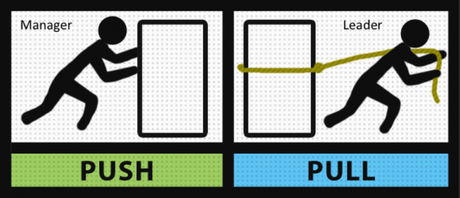
When it comes to restaurant management, the differences and similarities between managers and leaders is more important than just a job title. A good manager is someone who plans, leads, organizes, and controls the work of the organization's members in order to achieve the organization's goals in an effective and efficient manner. A good leader, on the other hand, sees the organization as a "team" and influences others to work towards their best potential. This has a lot of emotion involved, whereas managers simply focus on the organization's end goal.

Restaurants, just like every institution out there, need people who can properly manage tasks in order to achieve their goals. As the restaurant owner, it's your job to lead the organization into the direction you wish it would go. This means hiring the right people to manage your business (no easy task), which means keeping a sharp lookout for those who might make an ideal leader. And THEN properly training those potential leaders to lead your staff in your vision.
So let's dive a little deeper into the difference between management and leadership and how you can turn good restaurant managers into great restaurant leaders.
What is Management and Who are Managers?
Before we discuss how to turn managers into leaders, we must first explain exactly what management is and who managers are. Seems simple enough, but at this point, most of us are desensitized to the word "manager" and what exactly this person is supposed to do, so let's take a step back and re-evaluate this widely-used term.
In a coconut shell (why does it always have to be a nut?) managers are the people who are an authority and are focused on creating proper results for the betterment of the organization. Managers often see everyone as customers and clients and they tend to focus on the data and information on-hand. Sometimes in a sort of cold, disconnected way.

Management is, at its core, the process of getting things done in an effective and efficient manner. The process is varying with each type of manager. Managers are often divided into three categories: top, middle, and first-line.
In the restaurant business however, management doesn't always align with a corporate office job. More commonly in the restaurant industry you simply have top and first-line management (Owner & Managers). Top managers are the people who make decisions about the direction of the organization and establish policies & philosophies to achieve it. The top management in the restaurant business hierarchy is usually the business owners themselves: that means YOU.
First-line managers, on the other hand, are the supervisors who are in charge of the day-to-day activities. These are the types of managers you aim to hire to make your job as the restaurant owner easier.
The Three Roles of Restaurant Managers
According to Henry Mintzberg, a well-known Canadian academic and author on business and management, the job of manager can be broken down into three main roles:
- Interpersonal Roles

Interpersonal Roles are the ones that establish relationships. The managers that fall under this category function as the figurehead, the leader (hopefully), or liaison. Liaison is one of the most important roles here because it provides communication between the both the FOH and BOH staff and management. By establishing great communication skills, leaders aim towards creating a culture and that thrives.
- Informational Roles

Informational roles include collecting, receiving, and analyzing data. In other words, using technology, resources and reporting to track the success (or lack of) of the restaurant. This includes keeping up on sales, labor, recipe costing, ordering & invoicing, inventory management and beyond.
Managers have the responsibility to plan, organize, and control the business. And to execute that plan on a daily basis. To do this, it's important that managers build business systems that allow the entire staff to be more efficient, as well as leave little doubt as to how things should be done.
- Decisional Roles

Top-tier managers are often considered the ones making all the decisions in an organization. However, this isn't always the case. In fact when it comes to the bar and restaurant industry, determining who is making the decisions is often is as clear as a shower-steamed bathroom mirror.
In our experience, more often than not, first-line managers (GM's and assistant managers) make most of the decisions on a daily basis.
For example, let's say a server punches in late or has someone punch in for them. The restaurant owner usually isn't immediately going to make the decision on the issue. Rather, it goes through a process by which all first-line managers such as supervisors are involved in handling "first line" problems.
This of course depends on the bar or restaurant. Some owners are there 80 hours per week, acting as a worker (a separate catastrophic problem we'll save for another time), while other owners are completely absent. They are real estate investors or have another career and they bought a bar/restaurant because it sounded fun. A place they could bring their clients or friends to have a good time. These owners are almost always poor leaders.
Other decisions often put on the restaurant manager are: hiring, inventory management, finding the right POS system, menu management, staff training, entering daily sales, accounting and simply the overwhelming task of managing and fully systemizing the entire restaurant.
What's the Difference Between Managers and Leaders?
In the grand scheme of things, leaders have the same tasks as managers. In the process, involve themselves in making their team the best versions of themselves. They train, mentor, and guide employees into becoming the organization's model employees.
Leadership has a more emotional approach to achieving the organization's goals. If managers are tasked to simply meet the organization's goals and objectives, leaders are tasked to meet the organization's goals by teaching their staff to do their tasks efficiently and effectively.
By creating a working environment that thrives on teamwork and not a competition, leaders create opportunities for the organization sustainably. This means that there is a high possibility that with proper training of the team, the organization can still thrive even in the absence of the leader.
This is because a leader fosters the value of communication. Leaders don't simply make decisions as tasked by the organization but rather consider the pros and cons of each decision. They try to understand all aspects of the decision-making and know that whatever choice they decide, it can affect both the inside and outside resources of that certain decision.
Loyalty is King
Leaders are loyal and trustworthy. They present a commitment to guiding current employees to reach their full potential whilst sticking to the organization's mission and vision. They often look towards advancement and make use of their current resources to achieve that.
In the restaurant setting, leaders can often be the people most employees turn to before they turn to management. Here's a truth to consider: All leaders can be managers but not all managers are true leaders. The question is: how do you get the best of both worlds?
How to Train Your Restaurant Managers to be Great Leaders

In many organizations, especially in restaurants or the food and drink industry, general managers are put in position to work in lieu of the owner. General Managers are tasked to supervise and oversee the front and back of the house operations.
They deal with menu planning, marketing, training staff and other managers, and directly coordinating with the restaurant owner in making decisions to manage the restaurant's direction. The question for most organizations is whether or not their GM is already the leader the organization needs.
The first thing to consider is the set of people you employ. Among these managers, is there someone who stands out in terms of responsibility, communication and work ethic? Is there someone who upholds and commits themselves into following the restaurant's mission and vision? Do they have enough influence that their fellow employees follow their footsteps?
Is there someone who recommends the best hires and finds people who are as responsible as them? Do they have a history of producing great results/sales/improvement to the areas they are responsible for? Do they have the initiative to suggest new products, procedures, or systems and help put them in place? Do other staff members seek them out for guidance and help? Are they creative? Visionaries?
If one of your existing managers (or even server/bartender) has these traits, then there's a great chance that you have some great employees with leadership skills already. It's also important that managers know that you value and appreciate them.
Help Me Help You
In order to hone them to their fullest potential, it's imperative that these managers are aware of all the developmental professional enhancement they can seek out. Provide opportunities in which they can establish their personal goals and find means to achieve them.
In order to select your manager-leader, you need to choose the manager that exhibits most of the traits mentioned and look for more opportunities to learn. A great leader is always open to opportunities for growth, may it be personal or professional.
So give them more responsibility. A true leader doesn't shy away from a challenge; they charge straight ahead, towards it. These tasks can revolve around making them participate in higher-level meetings, include them in organizational decision-making, let them participate in the organization's new projects, and let them attend educational conferences.
On the other hand, if you currently have a handful of numbskulls working for you, it might be time to bring in a leader from the outside.
Leadership is a Process
While some are said to have been simply born with it, it's important to remember that just like anything that lasts, training the leadership skill is a process. In fact, owners themselves are not always the best choice to lead the troops. Sorry, but it's the truth.
However, I know some owners who run great bars and restaurants because they understand their strengths and weaknesses and they hire great people around them to run their business. These people may be the smartest of all.
The truth is, you'll know when you've successfully trained your managers into becoming manager-leaders when you see their consistent progress and growth by practicing mentorship with the staff, communication skills, their ability to accept criticism, as well as praise, with grace.
Leaders have plans cut out and follow through with them (execution). They also properly reflect on the things that made them succeed or fail. They treat every situation as a learning process. This allows them to be consistent in their progress.
Mentorship will always be one of the best ways to create and hone leaders. By surrounding yourself with great leaders, you learn to adapt their great traits while still being able to create your own leadership style. Mentoring others will also be a learning process because you learn which of your traits is great to follow and which ones aren't.
When it comes down to it, communication is the key component here, because leaders should always be able to deliver their message clearly and specifically; whether it be the staff, the guests or the owner. By being an open communicator, they open themselves up for criticism and praise, which leads to improvement.
In the process, they become reflective of their own learning and growth, and can impart it to others or the restaurant itself.

